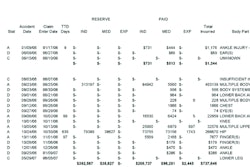In May, the National Council on Compensation Insurance (NCCI) released its annual State of the Line Workers' Compensation market analysis, describing the current state of the market as "conflicted." It notes, "in some ways, we are seeing an improved condition from 2010. By other measures, however, the market remains in a worrisome state. In sum, we see a market that is conflicted as to its forward trajectory, and that makes for a challenging environment."
As if that were not enough to concern employers, NCCI's new rating plan will begin in January 2013. Included in the State of the Line report was a map of the statusof the filings by state. When calculating an Experience Mod, there are two facets - primary loss and excess loss. The key change is that primary losses will double from the current cap of $5,000 to $10,000 in 2013, and eventually go up to $15,000 by 2015. Primary losses greatly influence the MOD; in fact, they are the most expensive dollars in every claim.
How the change will affect a company's Experience Modification Factor depends on the specific cost of individual claims, which, in turn depend upon employer safety management, claims management and return to work efforts. Simply put, if many of a company's losses exceed $5,000, an increase in the Mod is likely.
The Experience Mod is computed based on three complete years of loss data ending one year prior to the effective date of the rating period. In most cases, employers are operating in policy year 2012 now, which will not be calculated into the Experience Mod until the 2014 policy year.
Consequently, it should be clear that while the actual change is months away, the impact of the change is already here, as the primary losses that your company incurs now will affect future policy years. The importance of strengthening injury prevention and post-injury management programs ratchets up as deep losses will come back to bite employers in much higher premiums.
Other key takeaways from 2012 conference
- Claim frequency declined in 2011, but just minimally - 1%. Coupled with last year's increase, which was driven by employment factors, this suggests a slowing or flattening of the long-term downward trend.
- Medical costs for lost time claims rose four points.
- Premium prices are firming, with over 10% reporting prices up more than 11%.
- While the duration for temporary total disability rose significantly during the recession, the trend is moderating, probably a result of small claims coming back into the system and an improving economy.
- Claims with opioid use have a duration that is 50% longer and can be twice as long as other claims.
- Claims with comorbidity treatments cost twice as much as comparable claims. Hypertension is the most common comorbidity, followed by drug abuse, diabetes, and pulmonary issues. About 2/3 of comorbid claimants are male, with a much higher percentage of males diagnosed for drug abuse.
[Sidebar]
Learn How to Control Your Workers’ Comp Cost at NPE
The experience mod calculation is changing in 2013 (dates vary by state) for the first time in more than 20 years, and changes can dramatically lower your costs or explode them. At National Pavement Expo, Jan. 23-26 in Nashville, a new session presented by the Institute for WorkComp Professionals will teach you how you can control every aspect of your workers' compensation program including how to drive down your experience mod and how to keep your employees healthy and at work (and away from attorneys). You’ll work through upcoming experience mod changes and learn how your business can use them to your advantage. Take home proven strategies and specific easy-to-implement steps to keep your workers’ comp costs under control. For details and to register at www.nationalpavementexpo.com



















